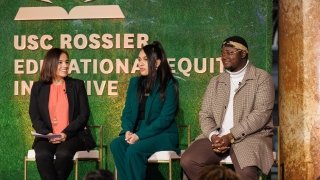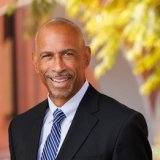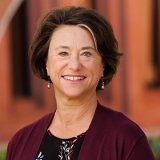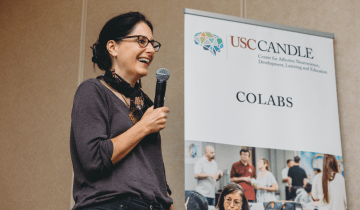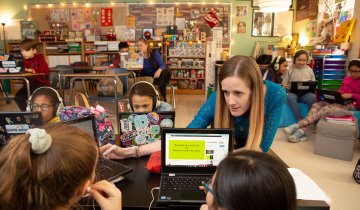How can we reinvent a system to be more responsive to the needs of every learner? How do we support educators amidst increasing pressure? How can we provide opportunities so a child’s destiny is not determined by their zip code or family income?
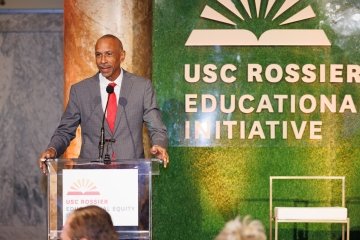
On November 17 at the Natural History Museum of Los Angeles County, Pedro Noguera, the Emery Stoops and Joyce King Stoops Dean, announced the USC Rossier Educational Equity Initiative, a series of projects designed to create transformative educational opportunities for children in Los Angeles and across the country.
“With these projects we can influence some of the most critical issues facing this country,” Noguera said. “The future will not be determined by what is happening in Washington but by what is happening in our schools. Our schools are where the next generation of scientists, artists and writers are now. They need to be well prepared to solve the problems of the 21st century.”
The initiative builds on USC Rossier’s focus on educational equity from the earliest grades through college and connects the research expertise of the school’s faculty with the work USC Rossier students and alumni are doing in the field. It supports these projects:
- The launch of a partnership with four schools in South and East Los Angeles. At these sites, USC Rossier will train new teachers, support existing teachers with professional development in instructional best practices at schools, and to work with other schools across USC to provide critical social services to children and families. These schools will build on the relationships USC Rossier began establishing with three Los Angeles Unified School District Demonstration site schools this fall. Professor Eugenia Mora-Flores and Assistant Professor Nasser Cortez are leading this work.
- Expand the highly successful Teacher Residency Program. This program provides full scholarships and financial support to students who have committed to working in L.A. public schools after graduation. The initiative’s goal is to expand this program to other schools and districts, and to increase the number of teachers produced, particularly in math and science.
- The USC Rossier STEAM Teaching and Research Center under the direction of Professor Christopher Emdin and Professor Gale Sinatra will serve as a research and practice hub focused on reimagining, improving and sustaining high-quality STEAM teaching and learning in K–12 classrooms in a way that authentically connects to students, including through the arts. Access to a robust and rigorous education in these areas is critical to expanding opportunities for children and addressing the challenges facing our nation and the world in the 21st century.
- The L.A. Research Policy Center will conduct research and analyze data that will be used to diagnose educational conditions and inform decision-making at schools and colleges in Los Angeles. Under USC Rossier’s leadership, this center will bring together researchers from across the university and other institutions. Similar centers have greatly benefited New York and Chicago, and now USC Rossier can do the same for Los Angeles. Professor Tricia Burch, Professor Julie Marsh, Associate Professor Morgan Polikoff and research scientist Anna Saavedra are developing the center.
- This fall the Democracy Project began piloting a curriculum that will give teachers the support they urgently need to address controversial topics in the classroom. The goal is to give teachers tools to help students learn about complex issues—the pilot curriculum covers immigration—while simultaneously teaching them how to do independent research and engage in civil discourse. Professor Jenifer Crawford and Professor Rob Filback have headed this work.
“When we talk about advancing educational equity, we are talking about improving the lives of students who go to school only a few miles away,” said Reveta Bowers BA ’70, Chair of the USC Rossier Board of Counselors and longtime leader of the Center for Early Education. “We’re talking about giving their teachers the training and continued support they need to thrive in the classroom. I am committed to USC Rossier because we need to be able to tell every parent, no matter their background, that their child can receive an excellent education.”
At the initiative launch, Derringer Dillingham MAT '22, a fourth grade teacher at 52nd Street Elementary School, and Jamie Roman Nunez MAT '22, who teaches algebra, geometry, statistics and probability at Dymally High School, discussed their experience in the teacher residency program and how it has allowed them to make an impact in their first year in the classroom.
“I had good teachers growing up but they didn’t look like me,” Dillingham said. “I can say I’m thankful I’m teaching in a community where the students can look up and say that’s someone like me.”
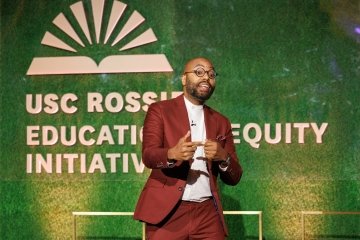
At the end of the evening, Emdin, the New York Times best-selling author who is changing how STEAM is taught, addressed why he chose to come to USC last year.
“The question becomes why Rossier?” Emdin asked. “The idea is to center an entire school of education, boldly and unapologetically, on educational equity. To say that we are no longer interested in small marks of success—one person here, one person there, because it’s not enough. We are at the right place, at the right time, with the right leadership, with the right people.”

